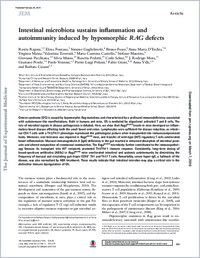Intestinal microbiota sustains inflammation and autoimmunity induced by hypomorphic RAG defects
- Rigoni, Rosita Milan Unit, Istituto di Ricerca Genetica e Biomedica, Consiglio Nazionale delle Ricerche, 20133 Milan, Italy - Humanitas Clinical and Research Center, Rozzano, 20089 Milan, Italy
- Fontana, Elena Department of Molecular and Translational Medicine, Pathology Unit, University of Brescia School of Medicine, 25123 Brescia, Italy
- Guglielmetti, Simone Department of Food, Environmental, and Nutritional Sciences (DeFENS), University of Milan, 20122 Milan, Italy
- Fosso, Bruno Institute of Biomembranes and Bioenergetics, National Research Council, 70126 Bari, Italy
- D’Erchia, Anna Maria Department of Biosciences, Biotechnology, and Pharmacological Sciences, University of Bari, 70121 Bari, Italy - Institute of Biomembranes and Bioenergetics, National Research Council, 70126 Bari, Italy
- Maina, Virginia Telethon Institute for Gene Therapy, Division of Regenerative Medicine, Stem Cells and Gene Therapy, Istituto di Ricovero e Cura a Carattere Scientifico (IRCCS) San Raffaele Scientific Institute, 20132 Milan, Italy
- Taverniti, Valentina Department of Food, Environmental, and Nutritional Sciences (DeFENS), University of Milan, 20122 Milan, Italy
- Carmina Castiello, Maria Telethon Institute for Gene Therapy, Division of Regenerative Medicine, Stem Cells and Gene Therapy, Istituto di Ricovero e Cura a Carattere Scientifico (IRCCS) San Raffaele Scientific Institute, 20132 Milan, Italy
- Mantero, Stefano Telethon Institute for Gene Therapy, Division of Regenerative Medicine, Stem Cells and Gene Therapy, Istituto di Ricovero e Cura a Carattere Scientifico (IRCCS) San Raffaele Scientific Institute, 20132 Milan, Italy
- Pacchiana, Giovanni Milan Unit, Istituto di Ricerca Genetica e Biomedica, Consiglio Nazionale delle Ricerche, 20133 Milan, Italy - 2Humanitas Clinical and Research Center, Rozzano, 20089 Milan, Italy
- Musio, Silvia Foundation IRCCS Neurological Institute, C. Besta, Neuroimmunology and Neuromuscular Disorders Unit, 20132 Milan, Italy
- Pedotti, Rosetta Foundation IRCCS Neurological Institute, C. Besta, Neuroimmunology and Neuromuscular Disorders Unit, 20132 Milan, Italy
- Selmi, Carlo Humanitas Clinical and Research Center, Rozzano, 20089 Milan, Italy,2,6
- Mora, J. Rodrigo Gastrointestinal Unit, Massachusetts General Hospital, Harvard Medical School, Boston, MA 02115
- Pesole, Graziano Department of Biosciences, Biotechnology, and Pharmacological Sciences, University of Bari, 70121 Bari, Italy - Institute of Biomembranes and Bioenergetics, National Research Council, 70126 Bari, Italy
- Vezzoni, Paolo Milan Unit, Istituto di Ricerca Genetica e Biomedica, Consiglio Nazionale delle Ricerche, 20133 Milan, Italy - Humanitas Clinical and Research Center, Rozzano, 20089 Milan, Italy
- Poliani, Pietro Luigi Department of Molecular and Translational Medicine, Pathology Unit, University of Brescia School of Medicine, 25123 Brescia, Italy
- Grassi, Fabio Istituto Nazionale Genetica Molecolare, Department of Medical Biotechnology and Translational Medicine, University of Milan, 20122 Milan, Italy - Institute for Research in Biomedicine (IRB), Faculty of Biomedical Sciences, Università della Svizzera italiana, Switzerland
- Villa, Anna Milan Unit, Istituto di Ricerca Genetica e Biomedica, Consiglio Nazionale delle Ricerche, 20133 Milan, Italy - Telethon Institute for Gene Therapy, Division of Regenerative Medicine, Stem Cells and Gene Therapy, Istituto di Ricovero e Cura a Carattere Scientifico (IRCCS) San Raffaele Scientific Institute, 20132 Milan, Italy
- Cassani, Barbara Milan Unit, Istituto di Ricerca Genetica e Biomedica, Consiglio Nazionale delle Ricerche, 20133 Milan, Italy - Humanitas Clinical and Research Center, Rozzano, 20089 Milan, Italy
-
29.02.2016
Published in:
- The journal of experimental medicine. - 2016, vol. 213, no. 3, p. 355-375
English
Omenn syndrome (OS) is caused by hypomorphic Rag mutations and characterized by a profound immunodeficiency associated with autoimmune-like manifestations. Both in humans and mice, OS is mediated by oligoclonal activated T and B cells. The role of microbial signals in disease pathogenesis is debated. Here, we show that Rag2R229Q knock-in mice developed an inflammatory bowel disease affecting both the small bowel and colon. Lymphocytes were sufficient for disease induction, as intestinal CD4 T cells with a Th1/Th17 phenotype reproduced the pathological picture when transplanted into immunocompromised hosts. Moreover, oral tolerance was impaired in Rag2R229Q mice, and transfer of wild-type (WT) regulatory T cells ameliorated bowel inflammation. Mucosal immunoglobulin A (IgA) deficiency in the gut resulted in enhanced absorption of microbial products and altered composition of commensal communities. The Rag2R229Q microbiota further contributed to the immunopathology because its transplant into WT recipients promoted Th1/Th17 immune response. Consistently, long-term dosing of broad-spectrum antibiotics (ABXs) in Rag2R229Q mice ameliorated intestinal and systemic autoimmunity by diminishing the frequency of mucosal and circulating gut-tropic CCR9+ Th1 and Th17 T cells. Remarkably, serum hyper-IgE, a hallmark of the disease, was also normalized by ABX treatment. These results indicate that intestinal microbes may play a critical role in the distinctive immune dysregulation of OS.
- Language
-
- English
- Classification
- Medicine
- License
- Open access status
- hybrid
- Identifiers
-
- RERO DOC 324429
- DOI 10.1084/jem.20151116
- ARK ark:/12658/srd1318920
- Persistent URL
- https://n2t.net/ark:/12658/srd1318920
Statistics
Document views: 177
File downloads:
- Texte intégral: 230
